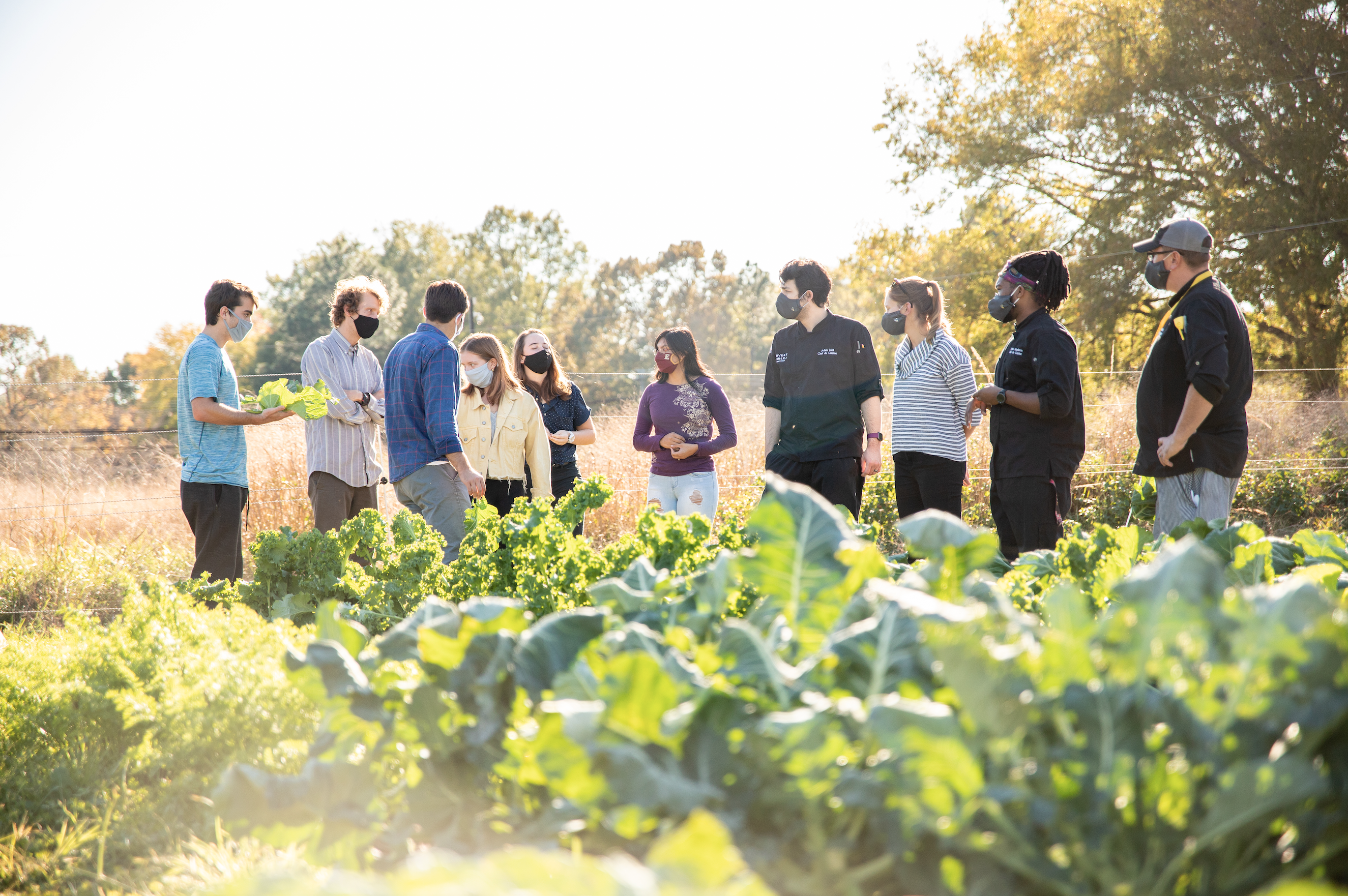Students in the Environmental Studies Senior Seminar are taking part in a nationwide project aiming to protect heirloom collards and delivering innovative collard green recipes to the Elon community.
Biscuits and sweet tea are staples in the South, but no Southern meal is quite complete without the salty, bitter goodness of a tasty batch of collards. The leafy vegetable is such an important part of Southern cuisine that a team of Elon seniors is finding ways to protect it.
A group of students in the Department of Environmental Studies Senior Seminar is working with the Southern Exposure Seed Exchange and partnering with the national Heirloom Collards Project to grow heirloom collards, save their seeds and help the plant’s many varieties live on for decades to come.
“It’s important to have a seed bank and seed saved because if there’s ever a drought or a virus or anything that impacts the monocultures, it will wipe out that entire culture,” said environmental science and ecology major Emma Salecki ‘21. “So if you have the seeds saved that are immune to that event, then you can still sustain the population.”

The Heirloom Collards Project focuses on studying collards for that exact reason. The project is a partnership of small community gardens, university research stations and other organizations committed to helping collards thrive. The project’s goal is to compile data on a variety of collards grown across the United States to learn about what varieties grow best in certain climates.
As a part of their partnership with the Heirloom Collards Project, the Elon students focused their research on four collard varieties, which they grew themselves at Elon’s Loy Farm. The seniors planted and cultivated the traditional Morris Heading collard, as well as North Carolina Yellow, Georgia Southern and Georgia Blue Stem collards. The group’s efforts were geared toward learning more about collards and promoting seed saving to protect the plant that means so much to this region.

“Seed saving is important in order to cultivate heirloom varieties,” said Julia Crabtree ’21, an environment sustainability major. “People aren’t really looking into other varieties, so they don’t know that they exist, and everything becomes funneled down into one variety, and that can harm the environment.”
While growing the collards, students studied the particular conditions that allowed each variety to grow successfully in North Carolina. The group specifically wanted to see which collards could possibly survive under harsher conditions.
“As climate changes, it will make certain species of plants not as resistant to the changes, so it’s important to be testing different varieties to see if they have traits that allow them to thrive in certain conditions,” said Liam Falter ’21, an environmental studies major who worked on the project.
The Senior Seminar is led by Lecturer in Environmental Studies and English Michael Strickland, Professor of Environmental Studies and Biology Janet MacFall, and Lecturer in Environmental Studies Jacob Rutz. Rutz, who is on the board of the Utopian Seed Project, says students are learning valuable lessons and helping a worthy cause with their research.

“This engages the students in a wider question in food system dynamics,” Rutz said. “Ultimately we have students working on a real-world project that’s creating data and information and sharing it with other organizations that has a lasting impact. It’s not one insular project, it’s actually something that stretches well beyond the bounds of Elon.”
While growing the collards at Loy Farm, students decided to take their research a step further. After charting the growth of each collard, they worked with Elon Dining and experts around the country to produce a tasting profile for each version. With the profile complete, Elon Dining chefs Adam Neill, Myles Hamilton and Mikel Rich created innovative recipes using the collards grown just down the road from main campus.
“Everyone is so passionate about this project,” said Caroline Redick, sustainability coordinator for Elon Dining. “And for these collards to be growing at Loy Farm where we can see them grow and then be able to serve them on campus is really cool.”
On Wednesday, three Elon Dining chefs introduced the new recipes to the Elon community in safe and physically-distanced tasting event outside Lakeside Dining Hall. The recipes included steamed collards, the traditional braised collards, a collard pesto sauce with pasta, and a North Carolina Yellow tempura fried with miso soy dressing. The event was an opportunity for students try new dishes while learning about the many varieties of such an important Southern food.

Although the group’s work is coming to a close for the semester, students and faculty hope their efforts don’t end with this project. Seeds from the current collard green program will be saved at Loy Farm and used for future research at Loy Farm. Faculty hope to one day expand that research to more plants and possibly deliver food straight from the farm to the plates of Elon students.
“We’re looking forward to the day where Elon Dining can have lines in the dining halls with particular dishes grown by Elon students, harvested by Elon students, and cooked on the Elon campus,” Strickland said.



